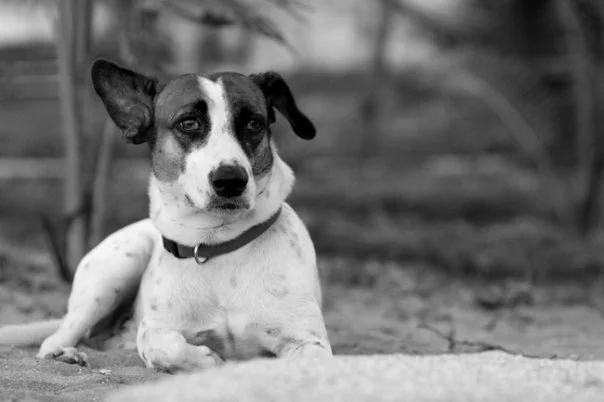
A Palapa in the Sun
My mom is anxiously waiting for my return – in part so that I can say goodbye, but also so she doesn’t have to do it alone. As I settle into my nine-hour drive home, I think about the last time I made such a heartbreaking journey.
“His heart stopped. They pushed me out of the room and I don’t know what’s going on.” I can vividly remember my mom struggling to get the words out over the phone as she broke down sobbing. Just one year ago, my dad had become suddenly ill while at home in Mexico. This morning I received a similar call from her. Our family dog, Chicklet, is sick. After two blood transfusions to extend his life, he has to be put down. My mom is anxiously waiting for my return – in part so that I can say goodbye, but also so she doesn’t have to do it alone. As I settle into my nine-hour drive home, I think about the last time I made such a heartbreaking journey.
* * *
The first flight I could get to Mexico wasn’t until the next morning. I packed a bag and didn’t sleep that night. On the plane, I put my headphones on to block out the cheerful noise of the families headed on vacation while I nervously stared out the window. The doctors had managed to stabilize Dad, but still, no one knew what was wrong.
After my plane touched down, I waited at the airport to meet my sister. While we were in the air, Dad had been transferred to another hospital further inland that had an intensive care unit. My sister and I wanted to get on our way, but friends implored us to spend the night. It was already dark, and we would be driving through a territory where fighting between officials and gangs had recently intensified. The local situation was so bad the ambulance had refused to transfer Dad until it was daylight. We slept restlessly. Neighbors were caring for Chicklet, and without him – without Mom and Dad – we were uncomfortable in the emptiness of their house.
Chicklet came into our lives by accident. Abandoned under a bridge to be eaten by crocodiles as a puppy, Chicklet managed to survive his first year by visiting construction sites and eating scraps from the workers. And this was how he showed up in our lives; when mom and dad were building their house in Mexico he just walked through the door one day and never left. As much as we referred to him as a rescue, we knew he didn’t see it that way. He tolerated our love but made it clear that he wasn’t going to follow any rules.
Whenever Chicklet was confident that no one was home – and he was frequently wrong – we would find him lounging on the couch, exactly where he knew he wasn’t allowed. When we travelled we would often have to pay for more expensive hotel rooms just to find ones that allowed dogs. One such room had special dog bowls, treats, and beds - not the king size people bed that Chicklet hopped right up on. When we hollered at him, he didn’t even flinch. He just looked at us as if to say 'nice call on the room guys. Thanks.' Inevitably someone would have to struggle to move his suddenly heavy body over enough to be able to crawl in to sleep.
Stubborn and brave, Dad would often say, “He’s just such a cool dog,” even though we all knew it already. Anyone who met Chicklet asked to adopt him, strangers on the street, friends, and even his vet. He captured hearts within minutes of meeting him. His irresistible heavy lidded brown eyes – bedroom eyes my aunt called them – and nonchalant attitude made everyone fall in love. Coming home from Mexico one year, I ran into a co-worker at the airport. He bent down to pet Chicklet and immediately asked to take him home. That’s how special Chicklet was. He and Dad quickly became best friends. From their challenging childhoods to being independent and stubborn adults, they shared a personality. They did what they wanted, always spoke their minds, and charmed the hell out of you by not giving a damn. And while no one, as best as I can remember, ever offered to adopt Dad, he was frequently fed by the neighbors anytime Mom was out of town.
Chicklet liked to wander and if you tried to call him back or chase after him, he would coolly evade your efforts while pretending not to hear you. Once he wandered off on a day trip and got left behind. When we realized it, Dad was quick to retrieve him. While Chicklet had always been a talker, making noises that varied from barks and whining to howls and yelps, he unleashed what we can only assume was a long stream of obscenities on Dad related to the indignity of his being abandoned that didn’t stop until they reached home. Neither of them let each other out of their sight much after that.
After a near-sleepless night in Mexico, my sister and I drove into the mountains. It was a hot, four-hour drive, made longer by the Federales’ checkpoints we were waved into. The new hospital was stark and clean. We entered through the billing department – the only way to access the patient rooms – and found Mom sitting in a hallway on the fourth floor.
Dad was in an induced coma and the doctors didn’t know if he would survive. We called our brother who flew in the next day. We spent the following ten days working with the doctors to make Dad well enough to fly back to Canada. When he was brought out of his coma he barely recovered consciousness, only briefly opening his eyes. He cried when we cried, but he couldn’t communicate. Our hearts were breaking. He was finally cleared for transport, but any relief we felt was short lived. The night that he was rolled into the emergency room at home he opened his eyes for the last time. Two days later the doctors finally gave us answers. A scan showed a massive blood clot that was slowly obscuring his brain. Dad would never wake up. We would never hear his voice again. After a few days when everyone had said their goodbyes, we took him off life support.
The medical team advised us that he would likely pass within a few hours, or perhaps a day. We stayed by his side, taking shifts so that he would never be alone. Hours passed, then days. We barely left the hospital. He slowly starved. He developed tremors. We didn’t know, and the doctors couldn’t tell us if he could hear us, if he was in pain, or if he was scared. We held his hand and talked to him, even if all it did was comfort us. We were all in limbo. We had no hope, but we couldn’t begin grieving yet. Always a skinny guy, Dad had often bragged about how he had weighed the same since high school, but now the digital scale on his bed showed a steady decline. His organs were slowly shutting down. His eyes stopped closing. We huddled together, as if for warmth, our shared pain isolating us from the world that was carrying on around us. We waited.
It was a dreary February morning when Dad finally left us. We held his hands and told him it was okay to go. His tremors became more pronounced, he gasped, his body became rigid, and then nothing. We gathered our things and for the first time in nearly a month we stepped back into the outside world, unsure of where we belonged.
* * *
It has been a year and we still haven’t adjusted to our lives without Dad. We don’t know where we belong, except to each other. I am exhausted as I finally pull off the highway to find Mom and Chicklet. We feed him steak for breakfast and take him to his favorite park to sit on the damp grass. I’m sure he is annoyed by all the attention, but he lacks the energy to shrug it off. Finally, the time comes, and we drive to the vet. I sit in the back of the car petting him, running my hand over his protruding ribs. I tell him how much we are going to miss him. I am holding back tears as I carry his little body inside. As a family, we’ve had over a dozen dogs and have stood here, in this same situation, many times before. But I always feel uncertain. I ask the vet for confirmation that this is the right – the only – decision. She shows me his x-rays and explains about the tumor and the complications. The dark mass growing inside him looks not unlike the one that slowly took Dad from us. It is pressing on his stomach and preventing him from eating. If we do nothing – he too will starve to death. This is the closest I will come to being sure we were making the right decision. “I think that pets, unlike people, are lucky that we have an option to end their pain and suffering so peacefully,” she says. We stroke his head and tell him that he is going to see Dad while the vet gives him the injection. And in an instant, he is gone.
Mom and I sit in the car outside the vet’s office for a long time, each one offering to drive, but neither of us able to. I think about the year before when we had finally returned to Mexico, after Dad died. Chicklet had barked, yelped, and howled when he saw us. He’d made panicked sounds that brought tears to my eyes. He’d jumped into my arms, scolding me for leaving him for so long, and then scrambled desperately to leap into Mom’s lap before she could get out of the car. But after greeting us, he kept searching. He started running circles around us, sniffing, and whimpering, looking for Dad. Later that day I was sitting on the floor when Chicklet walked over and curled up in my lap. All I could think was, 'what will we do when we lose him too? This little furry connection to Dad, the last dog we will all have together.' Today we found out. Today we said goodbye to another member of our family. The only comfort Mom and I finally find is knowing that he is no longer searching for Dad. Somewhere they have found each other again. We picture them, sitting on a beach under a palapa in the sun waiting for the fish to arrive. And with that we finally drive away.


